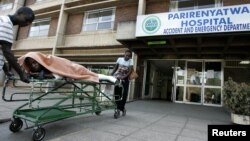Scores of senior doctors in Zimbabwe’s public hospitals have threatened to strike starting Thursday, if the government fails to meet their demand for better salaries and working conditions.
They would join hundreds of their junior counterparts, who’ve been on strike since September 3 for the same reasons. Patients are being turned away from public health facilities amid the southern African country’s protracted economic crisis, given shortages of staffing, medical equipment and supplies.
“Appalling and disgraceful” conditions have left “no option but to openly declare our incapacitation,” the Senior Hospital Doctors Association said in a statement, setting a deadline of Thursday for President Emmerson Mnangagwa’s government to respond.
According to the Zimbabwe Health Service Board, the government employs roughly 1,550 doctors and specialists in public hospitals serving the southern African country of 14 million.
Doctors have complained that their salaries – less than US$200 a month for juniors – barely cover their living expenses amid the country’s protracted economic crisis.
Almost all of the 524 junior doctors are believed to be striking. About 200 more doctors, including specialists, would walk off the job in a strike by seniors.
Dr. Paulinus Sikosana, who chairs the Zimbabwe Health Service Board, urged the senior doctors to keep working for the sake of patients.
“While we try to negotiate, perhaps, we appeal to the doctors’ consciences … to look after the lives of patients, especially those who have no recourse” in the private medical sector,” Sikosana told VOA when reached by phone Tuesday in Harare, the capital.
Sikosana said the government recently began re-equipping some hospitals with the help of foreign donations from the United Arab Emirates and India.
He added that the government allows its senior doctors to have private practices, through which they can earn extra money.
“We have given them permission to do private practice even during working hours,” Sikosana said. He noted that the senior doctors also can admit their private patients into public hospitals for operations.
Sikosana said the government recently began re-equipping some hospitals with the help of foreign donations from the United Arab Emirates and India.
The country’s poor economy has strained the government’s ability to provide much-needed foreign capital, Sikosana said.




